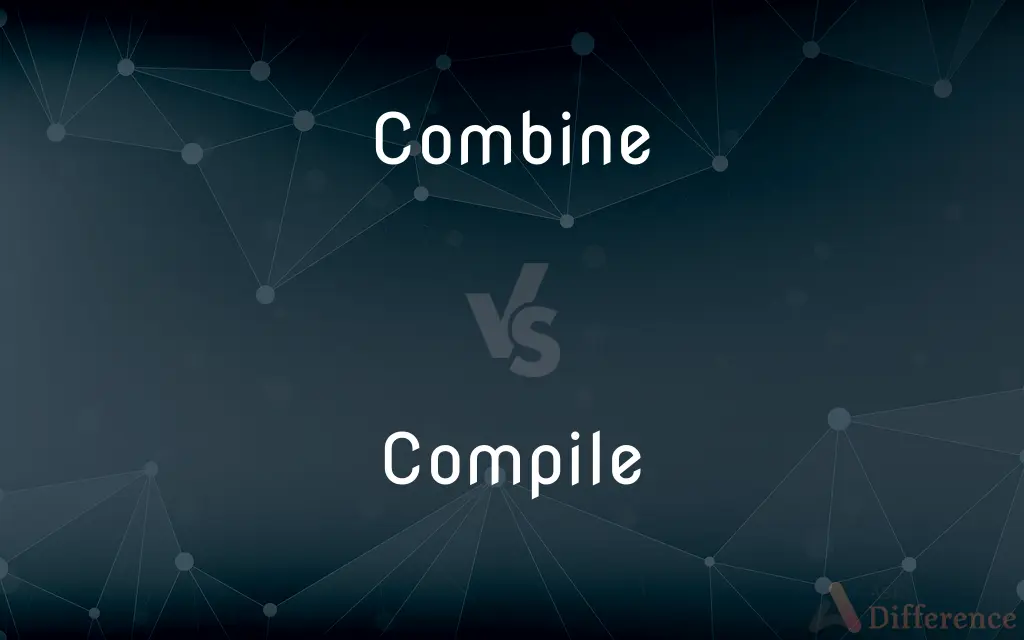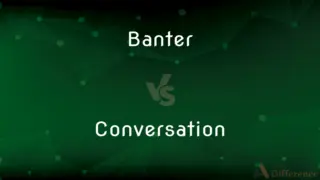Combine vs. Compile — What's the Difference?
By Maham Liaqat & Urooj Arif — Updated on March 19, 2024
Combine refers to mixing or joining things together, while compile involves gathering and assembling information from various sources.

Difference Between Combine and Compile
Table of Contents
ADVERTISEMENT
Key Differences
To combine means to bring together various elements to form a whole or to mix them in such a way that they become inseparable. This action emphasizes the blending or unification of components, which could be ideas, materials, or data, resulting in a product or concept that integrates the characteristics of the combined elements. On the other hand, to compile is to collect and assemble information, documents, or data from different sources, often for a specific purpose, such as creating a report, a list, or a database. Compiling often involves organizing the gathered material in a coherent order or structure.
Combining is often seen in contexts where the merging of elements leads to the creation of something new or enhanced, such as in cooking, chemistry, or collaborative projects. The focus is on the synergy or integration of the components. Conversely, compiling is typically used in contexts that require research, documentation, and aggregation of information, such as in academic writing, software development (compiling code), or data analysis, where the emphasis is on the selection and organization of existing material.
In the process of combining, the individual elements may lose their distinct identities to some extent, merging into a new form. This is common in physical and creative processes, where the blend creates a new entity with its own properties. In contrast, when compiling, the individual pieces of information or data retain their separate identities but are brought together in a structured format, allowing for easier access, analysis, or presentation.
Combining can involve a degree of creativity and innovation, as it might require envisioning how different elements can work together to form a cohesive whole. This is evident in fields such as art, design, and engineering. Compile, however, leans more towards methodical and analytical processes, where the focus is on meticulous gathering, sorting, and structuring of information, as seen in scholarly research, programming, and archival work.
While both combining and compiling involve bringing together disparate elements, the key difference lies in the outcome and the process: combining results in a blend or fusion where the elements intermingle, whereas compiling involves gathering and arranging without necessarily blending the elements into a single entity.
ADVERTISEMENT
Comparison Chart
Definition
To mix or join things together to form a whole
To gather and assemble information from various sources
Focus
Blending or unification of components
Selection and organization of material
Context
Often used in cooking, chemistry, and collaborative projects
Common in academic writing, software development, data analysis
Outcome
Creation of a new entity with merged characteristics
Structured collection of information retaining individual identities
Process
May involve creativity and innovation
Involves methodical gathering and sorting
Compare with Definitions
Combine
To merge two or more elements into a single entity.
Chefs combine ingredients to create new flavors.
Compile
To create a list or collection systematically.
The editor compiled a comprehensive anthology of modern poetry.
Combine
To join forces or efforts for a common purpose.
The companies combined resources to fund the research project.
Compile
In computing, to translate source code into executable code.
The developer compiled the program to check for errors.
Combine
Combining can also refer to the integration of ideas or concepts.
The team combined their diverse ideas to solve the complex problem.
Compile
To gather materials for a specific purpose, such as a report or book.
The historian compiled archival documents for her new book on the era.
Combine
In agriculture, a combine is a machine that harvests grain crops.
The farmer used a combine to efficiently harvest the wheat.
Compile
To collect and assemble information from different sources.
The researcher compiled data from various studies for the meta-analysis.
Combine
In sports, a combine refers to a showcase event for prospective players.
Athletes perform at the combine to impress professional scouts.
Compile
Compiling can involve the organization of information for easier reference.
The librarian compiled a bibliography of resources on the subject.
Combine
To bring into a state of unity; make united
Combined the ingredients in a bowl.
Combined the eggs and flour.
Compile
To gather into a single book.
Combine
To join (two or more substances) to make a single substance, such as a chemical compound; mix.
Compile
To put together or compose from materials gathered from several sources
Compile an encyclopedia.
Combine
To have, exhibit, or involve in combination
The choreography combines artistry and athletics.
Compile
(Computers) To translate (a program) into machine language.
Combine
(kŏmbīn′) To harvest (a grain crop) using a cutting, threshing, and cleaning machine.
Compile
(transitive) To put together; to assemble; to make by gathering things from various sources.
Combine
To become united
Factors that combined to produce a storm.
Compile
(obsolete) To construct; to build.
Combine
To join together for a common purpose.
Compile
To achieve (a break) by making a sequence of shots.
Steve Davis compiled a 147.
Combine
(Chemistry) To form a compound.
Compile
To use a compiler to process source code and produce executable code.
After I compile this program I'll run it and see if it works.
Combine
(kŏmbīn′) To harvest a grain crop using a cutting, threshing, and cleaning machine.
Compile
To be successfully processed by a compiler into executable code.
There must be an error in my source code because it won't compile.
Combine
A power-operated harvesting machine that cuts, threshes, and cleans grain.
Compile
To contain or comprise.
Combine
An association of people or groups united for the furtherance of political or commercial interests.
Compile
(obsolete) To write; to compose.
Combine
A combination.
Compile
(programming) An act of compiling code.
Combine
(transitive) To bring (two or more things or activities) together; to unite.
Combine the milk and the hot water in a large bowl.
I'm combining business and pleasure on this trip.
Compile
To put together; to construct; to build.
Before that Merlin died, he did intendA brazen wall in compass to compile.
Combine
(transitive) To have two or more things or properties that function together.
Joe combines the intelligence of a rock with the honesty of a politician.
Compile
To contain or comprise.
Which these six books compile.
Combine
(intransitive) To come together; to unite.
Two substances that easily combine
Compile
To put together in a new form out of materials already existing; esp., to put together or compose out of materials from other books or documents.
He [Goldsmith] compiled for the use of schools a History of Rome.
Combine
(card games) In the game of casino, to play a card which will take two or more cards whose aggregate number of pips equals those of the card played.
Compile
To write; to compose.
Combine
(obsolete) To bind; to hold by a moral tie.
Compile
To process (computer program source code) with a compiler{2} to produce an assembly-language program or an executable program in machine language.
Combine
A combine harvester
We can't finish harvesting because our combine is stuck in the mud.
Compile
Get or gather together;
I am accumulating evidence for the man's unfaithfulness to his wife
She is amassing a lot of data for her thesis
She rolled up a small fortune
Combine
A combination
Compile
Put together out of existing material;
Compile a list
Combine
Especially, a joint enterprise of whatever legal form for a purpose of business or in any way promoting the interests of the participants, sometimes with monopolistic or fraudulent intentions.
The telecom companies were accused of having formed an illegal combine in order to hike up the network charges.
Compile
Use a computer program to translate source code written in a particular programming language into computer-readable machine code that can be executed
Combine
An industrial conglomeration in a socialist country, particularly in the former Soviet bloc.
Combine
(art) An artwork falling between painting and sculpture, having objects embedded into a painted surface.
Combine
(American football) A Test match in which applicants play in the hope of earning a position on a professional football team.
Combine
To unite or join; to link closely together; to bring into harmonious union; to cause or unite so as to form a homogeneous substance, as by chemical union.
So fitly them in pairs thou hast combined.
Friendship is the cement which really combines mankind.
And all combined, save what thou must combineBy holy marriage.
Earthly sounds, though sweet and well combined.
Combine
To bind; to hold by a moral tie.
I am combined by a sacred vow.
Combine
To form a union; to agree; to coalesce; to confederate.
You with your foes combine,And seem your own destruction to design
So sweet did harp and voice combine.
Combine
To unite by affinity or natural attraction; as, two substances, which will not combine of themselves, may be made to combine by the intervention of a third.
Combine
In the game of casino, to play a card which will take two or more cards whose aggregate number of pips equals those of the card played.
Combine
Harvester that heads and threshes and cleans grain while moving across the field
Combine
A consortium of independent organizations formed to limit competition by controlling the production and distribution of a product or service;
They set up the trust in the hope of gaining a monopoly
Combine
An occurrence that results in things being united
Combine
Put or add together;
Combine resources
Combine
Have or possess in combination;
She unites charm with a good business sense
Combine
Combine so as to form a whole; mix;
Compound the ingredients
Combine
Add together from different sources;
Combine resources
Combine
Join for a common purpose or in a common action;
These forces combined with others
Combine
Gather in a mass, sum, or whole
Combine
Mix together different elements;
The colors blend well
Common Curiosities
How does combining differ from compiling in terms of outcome?
Combining often results in a new entity with merged characteristics, while compiling produces an organized collection of separate elements.
What does it mean to combine ingredients in cooking?
Combining ingredients in cooking means to mix them together to create a dish, often resulting in new flavors and textures.
How is compiling used in academic research?
In academic research, compiling involves gathering data, studies, or bibliographic sources to support an argument or thesis.
What is the importance of compiling in historical research?
Compiling is vital in historical research as it involves collecting historical documents, testimonials, and artifacts to construct a comprehensive and accurate account of past events.
How does combining differ from mixing in terms of process and outcome?
Combining often implies a more deliberate and purposeful integration of elements to achieve a specific outcome, whereas mixing might be more general and not necessarily aimed at creating something with new properties.
What role does combining play in the creative process?
In the creative process, combining plays a crucial role by merging diverse concepts, styles, or media to create innovative and original works.
Can combining elements lead to entirely new products or solutions?
Yes, combining different elements, whether they are materials, technologies, or ideas, can lead to the creation of entirely new products or innovative solutions to problems.
Can combining involve blending intangible elements?
Yes, combining can also refer to blending ideas, talents, or efforts in collaborative endeavors.
How does compiling contribute to data analysis?
Compiling contributes to data analysis by systematically gathering and organizing data from multiple sources, making it easier to analyze trends, patterns, and correlations.
How does the concept of combining apply to team dynamics and collaboration?
In team dynamics, combining refers to integrating diverse skills, perspectives, and expertise of team members to achieve a common goal more effectively and creatively.
What is the significance of compiling in software development?
Compiling in software development is crucial for transforming written code into an executable program that a computer can run.
Can combining methods from different disciplines lead to new scientific breakthroughs?
Yes, interdisciplinary combining of methods and concepts from different scientific disciplines can lead to novel approaches and breakthroughs in research.
In what ways can compiling be beneficial in educational settings?
Compiling can be beneficial in educational settings by organizing learning materials, resources, and references in a structured manner, facilitating access and study for students and educators.
What challenges might arise when compiling information from multiple sources?
Challenges in compiling information can include ensuring accuracy, dealing with conflicting data, and maintaining a coherent structure amidst diverse materials.
How can compiling be used in personal knowledge management?
In personal knowledge management, compiling can be used to systematically gather, organize, and categorize information, making it easily retrievable and useful for personal growth and learning.
Share Your Discovery

Previous Comparison
Banter vs. Conversation
Next Comparison
Jersey vs. JacketAuthor Spotlight
Written by
Maham LiaqatCo-written by
Urooj ArifUrooj is a skilled content writer at Ask Difference, known for her exceptional ability to simplify complex topics into engaging and informative content. With a passion for research and a flair for clear, concise writing, she consistently delivers articles that resonate with our diverse audience.
















































